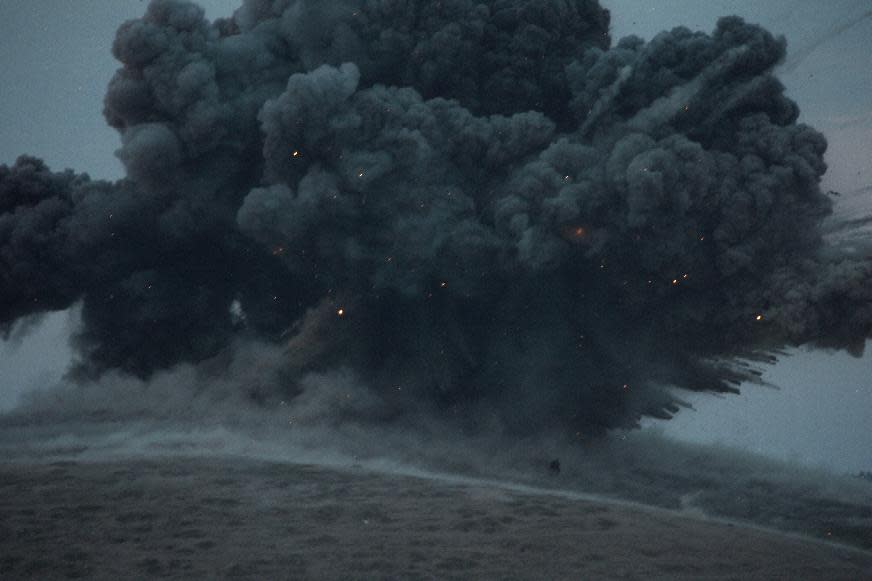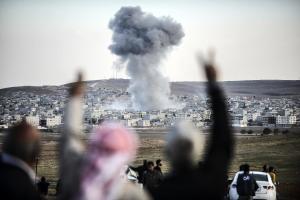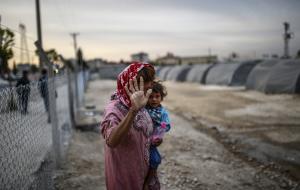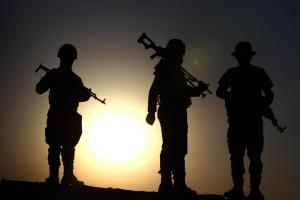US-led strikes kill more than 500 militants in Syria

By Fulya Ozerkan with Mohamad Ali Harissi in Beirut2 hours ago

Islamic State (IS) militants during an air strike on a hill at Yumurtalik village near the Syria-Turkey border on October 23, 2014 (AFP Photo/Bulent Kilic)
Mursitpinar (Turkey) (AFP) - US-led air strikes in Syria were reported Thursday to have killed more than 500 jihadists in a month, as Kurdish fighters readied to reinforce the embattled border town of Kobane.
The battle for Kobane has become crucial for both the Islamic State (IS) group and its opponents, with a senior US official saying the Kurds there were inflicting heavy losses on the jihadists.
IS, which declared in June a "caliphate" over territory it seized in Iraq and Syria, was described Thursday as the world's wealthiest "terror" group, earning $1 million a day from black market oil sales alone.
The Kurds in Kobane have been holding out against it for more than a month, buoyed by a promise of Iraqi Kurd reinforcements and by US air drops of weapons.
Turkish President Recep Tayyip Erdogan said Thursday that 200 Iraqi Kurd peshmerga fighters would travel across his country to join the battle in Kobane, where IS has an estimated 1,000 militants.
The US and its Arab allies have also been stepping up air strikes against IS in Syria.
On Thursday evening an AFP photographer across the frontier captured on film the moment another one apparently hit an IS position atop a hill west of Kobane.
View gallery

People in Mursitpinar, Turkey, gesture as smoke rises in the sky following an attack by jet aircraft …
A huge fireball dwarfed the few militiamen who had been seen manning the post under the jihadist group's black flag.
The month-old aerial campaign has killed 553 people, all but 32 of them jihadists mostly drawn from overseas, the Syrian Observatory for Human Rights said.
The jihadist toll included 464 IS militants and 57 fighters from the Al-Qaeda affiliated Al-Nusra Front, said the Britain-based Observatory, which relies on a wide network of sources inside Syria.
- 'World's richest terrorists' -
After first focussing on Iraq, the American-led coalition has dramatically expanded its strikes in Syria recently, including in Kobane.
US Central Command said in its latest update that fresh raids near the town destroyed IS fighting positions, a vehicle and a command and control centre.
View gallery

A Syrian Kurdish woman walks with her baby on October 23, 2014, in the Rojava refugee camp at Suruc …
In Iraq, IS targets hit included fighting positions, a vehicle and a training centre.
David Cohen, the US Treasury undersecretary for terrorism and financial intelligence, said Thursday that IS's "primary funding tactics enable it today to generate tens of millions of dollars per month".
Oil has also been sold to Kurds in Iraq, and then resold to Turkey, as IS has "tapped into a long-standing and deeply rooted black market connecting traders in and around the area," said Cohen.
Even Syrian President Bashar al-Assad's regime has got in on the act and "made an arrangement to purchase oil" from the jihadist group, he said.
Marwan Muasher of the Carnegie Endowment for International Peace said IS was now "considered the world's wealthiest and most financially sophisticated terrorist organisation".
On the ground, the jihadists made fresh advances in and around Kobane, said the Observatory.
View gallery

Iraqi Kurdish Peshmerga fighters take position on the front line in Khazer, west of Arbil, on August …
IS had also taken control of a string of villages west of Kobane, after days of trading territory with the Kurds with neither side gaining a decisive edge.
Kurds say their fighters are exhausted and anxious for promised reinforcements from Iraq's autonomous Kurdish region.
Lawmakers there agreed Wednesday to send their peshmerga fighters, after Turkey said it would allow them to travel through its territory to Kobane.
One Iraqi Kurdish official said the fighters "will remain there until they are no longer needed".
- Mount Sinjar besieged -
In Iraq, IS fighters killed a Yazidi commander after surrounding Mount Sinjar in the country's north, where they had trapped thousands of civilians this summer.
The civilians, mostly members of the Yazidi religious minority, eventually escaped via Syria with the help of Kurdish fighters from Iraq's neighbour to the west, but that route has now been cut.
"The mountain is besieged" again, and IS militants are "trying to climb the mountain on foot to fight the Yazidi volunteers," Dawud Jundi, another commander of the forces defending the area, told AFP by telephone.
The IS assault began Monday, when some 300 of the militants seized nearby villages and then turned their sights on the mountain itself.
"We don't have anything but light weapons," Jundi said, adding that on Mount Sinjar "there are almost 2,000 families whose situations are very bad".
The first siege of Mount Sinjar was a key moment in the conflict with IS, with the plight of the people trapped on the mountain helping to prompt Washington to begin air strikes against the jihadists.
The Iraqi capital Baghdad has also seen a wave of bomb attacks against Shiite targets in recent days, with IS claiming responsibility for some.
On Thursday IS jihadists gained more ground west of Baghdad, further reducing the government's shaky hold on Anbar province, a day after car bombs in the capital killed at least 28 people.

The battle for Kobani has become crucial for both the Islamic State and Kurdish fighters.
Reinforcements sent in